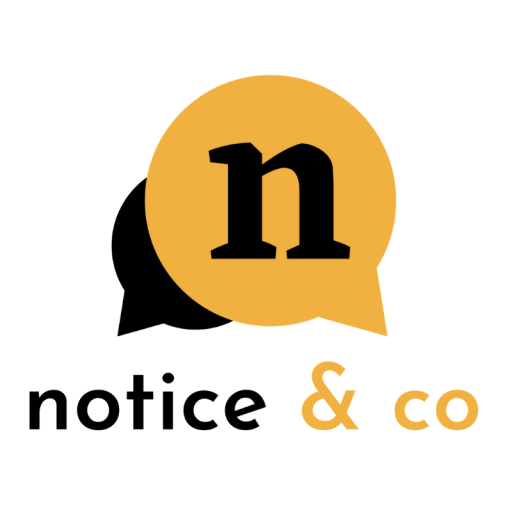Every single business we’ve worked with at Notice & Co wants the same thing: to attract and nurture quality leads and turn them into loyal customers.
But it’s rarely that easy.
How do you find the time to manage every social media interaction, send out all those special offer emails, personalise those emails, AND track all the data coming your way (not to mention the other admin tasks that seem to pop up out of nowhere on the daily)?
The answer? You guessed it: marketing automation.
With more than a decade specialising in B2B marketing and unlocking the power of ActiveCampaign, our founder, Deanna knows a thing or three about marketing automation.
In this article, we’ll cover what marketing automation is and the benefits it can bring to your business, including how you can use it to eliminate manual business processes, save time and improve your conversions.
What is marketing automation?
Marketing automation means using software to automate, optimise and measure your marketing. The marketing tasks you can automate are practically endless and include email campaigns, social media marketing, customer interactions, copywriting, and advertising.
Automation in real life
One of the cornerstones of marketing automation is the ability to set up a series of marketing actions triggered by specific user behaviours – such as signing up for a newsletter or making a purchase.
Perhaps you’re an online coach who works with women in organisations AND women business owners. You have a lead magnet called ‘What’s Holding You Back In Your Business?’. If someone downloads that, you know they’re likely to own a business rather than being an employee.
When you have an email marketing automation campaign in place, once they request the lead magnet, a series of actions are automatically triggered:
- The PDF is emailed to the business owner.
- Their details are stored in your automation platform.
- They are put into a ‘bucket’ (aka a segment) of customers labelled ‘business owners’.
- Then, a week after the first email is sent, a follow-up email is sent – asking them how they liked their free PDF.
The list could go on (and on) depending on how you set your automation up. It could include sending them future emails based on their preferences. It could shoot them a special, new customer offer 30 days after their download. You could push them into a custom Facebook audience to retarget them, too. All while you focus on other aspects of your business.
And what happens without a marketing automation campaign? Well, nothing. They hand over their email to you. They can download the PDF. You can extract the email from the backend of your website. Then zilch. No follow-up email. No buckets. Nothing.
The key benefits of marketing automation

The stats behind the benefits of marketing automation don’t lie. One 2022 study revealed that businesses using marketing automation to nurture prospects get a 451% increase in qualified leads! So apart from crazy percentiles, what are the other benefits of automating your marketing tasks?
Scalable and Repeatable Marketing Processes
One key benefit of marketing automation is that it can empower your business to automate repetitive tasks such as sending emails, managing social media, and tracking website interactions.
For example, if you own a Yoga studio and use your social media presence to reach more clients, you could automate your posts using scheduling tools to ensure a consistent presence without the need for manual posting every day. This not only simplifies the management of your studio’s digital presence but also allows you to maintain a steady stream of content that aligns with your yoga philosophy and engages your audience – ultimately fostering a stronger online community for your studio.
Efficient Resource Management
For small businesses or large enterprises, automating routine marketing tasks means your team will have more time and resources to focus on creative and strategic endeavours rather than getting bogged down with low-yield tasks.
For a weight loss coaching business, for example, using automation to score leads could involve automatically assessing how interested potential clients are based on their past interactions with emails, website visits, and downloads. The coaching team can then focus their attention on leads that show the most interest in weight loss services.
Enhanced Customer Journey and Personalisation
Automation can tailor experiences for users depending on their preferences in order to improve their experience.
Just like the online coaching business for women (see above), your audience can be sent content and products related to what you already know about them. Maybe they’ve only ever clicked on content about climbing the career ladder, which means you probably wouldn’t recommend the ‘Running Your Business Efficiently’ webinar in the next campaign you send to them.
Smarter Email Campaigns
Email automation allows you to refine your email targeting and content delivery, ensuring that your message reaches the right person at the right time. When paired with effective messaging, this can lead to higher open rates and click-through rates.
Let’s say you’re an eCommerce retailer. With automated email campaigns, your customers can receive reminder emails with personalised product recommendations after they have abandoned their shopping cart – enticing them to complete their purchase (and increasing your conversions).
Data-Driven Decisions: Insights and Analytics
With marketing automation, you can easily monitor the performance of your campaigns to gather valuable insights. This data-driven approach can help you continually refine and improve your marketing strategy – so you get the most out of your efforts.
If you’re an accountant who wants to make more accurate decisions in less time, automated accounting software can simplify calculations and report generation, allowing you to quickly analyse data and identify trends. This streamlined approach can improve the accuracy and efficiency of your financial reporting and ensure you make decisions based on a more comprehensive understanding of the data.
Boosting ROI and Conversions
Another significant benefit of marketing automation is the potential to boost your return on investment (ROI) and increase conversions. By using data and automation to target the right audience with the right message, you can drive more sales and revenue.
For example, many subscription service businesses implement marketing automation to send targeted email campaigns to different customer segments. By looking at past purchasing behaviour and preferences, you can ensure each customer receives personalised product recommendations – increasing the likelihood of conversions and boosting ROI.
Cross-Channel Marketing Efficiency
Automation allows you to run campaigns across multiple platforms and channels, ensuring consistent and coordinated marketing messages. This can help you build a strong brand presence by engaging your audience wherever they are.
If you’re a marketing agency launching a new service, for example, you can promote it simultaneously through email newsletters, social media posts, and online advertisements all at once – maximising your reach, impact, and revenue.
Aligning Marketing and Sales Teams
When implemented effectively, marketing automation can bridge the gap between your sales and marketing departments, resulting in more effective lead nurturing and higher conversion rates. How?
Well, imagine you’re a team of naturopaths that help clients overcome their health concerns naturally. By using automated tools to track customer interactions, your marketing team can gather valuable insights to give to the sales team about client preferences and behaviours . By integrating automation, your team can create a cohesive and efficient approach to client engagement, leading to improved lead quality and increased conversions.
Precise Attribution and Insights
Marketing automation tools can make it simpler to track the customer journey and attribute sales to specific marketing efforts. This can result in more refined marketing strategies and better allocation of resources – because you can see what’s working and why.
Whether you’re a service-based business like a coach or personal trainer, or sell products online, having automation in place means you can track customer journeys from awareness to purchase and get insights into the most effective touchpoints. This information can then guide your marketing decisions and ensure your resources are allocated to the stages that drive the most conversions.
Quality Lead Generation and Scoring
Marketing automation doesn’t just amplify leads; it enhances their quality. Lead scoring can significantly increase the efficiency of sales teams by showing them a hot list of leads – typically resulting in higher sales conversion rates.
Many gyms use this kind of automation to attract potential members and convert them into paying customers. A quality lead could be someone who takes the step to sign up for trials or classes, showing a real interest in what the gym provides. This engagement signals that they are actively seeking to experience the gym’s offerings firsthand, making them promising candidates for further engagement and potential membership.
Mastering Customer Interactions
Automation can give you comprehensive control over each customer touchpoint, ensuring that all the interactions you have with your customers are consistent and meaningful.
Imagine you own a real estate agency that uses email marketing to stay in touch with clients. When someone shows interest in a property or visits an open house, the system automatically sends them friendly and personalised follow-up emails. This helps make sure every customer gets a consistent and timely experience, showing that you value their interest and want to keep them in the loop.
Building a Stronger Brand Perception
Consistent and personalised marketing can uplift your brand’s image and perception in the market – elevating trust and credibility in your business.
In fact, many eCommerce businesses integrate automation into their customer support systems. Automated responses to common queries, quick issue resolution, and proactive communication can showcase your commitment to customer satisfaction.
Work-Life Balance and Employee Satisfaction
Automation can indirectly lead to reduced workloads, increased job satisfaction, and a better work-life balance for your team. It can reduce the stress of manual and repetitive tasks – allowing your team to focus on more meaningful work.
For one coach we recently worked with, who has a virtual assistant, automation was put in place to handle tasks like appointment scheduling and calendar invites. Now, the VA has more time to immerse themselves in more varied and engaging tasks – creating efficiencies both within the role and the business.
Fostering Creativity and Innovation
By handling routine tasks, automation can free up teams to channel their energy toward creative and strategic tasks, leading to more innovative and effective marketing campaigns.
Say you’re a wellness coach and you want to innovate and create new offerings, but you just can’t find the time. By automating routine administrative tasks, you can finally give yourself more time for strategic thinking and program development. Automation can also streamline client communication, appointment scheduling, and data management, freeing you up to focus on creating innovative programs and content.
Improved Accountability and Team Dynamics
Automation tools can provide clarity in metrics and accountability, fostering transparent and productive team dynamics. Everyone is on the same page, working towards common objectives.
Sales and marketing teams can use automation to track progress toward quarterly goals in order to stay on track. Plus, automated notifications celebrate achievements and provide insights into areas that need improvement, promoting accountability and a collaborative approach to reaching targets.
Implementing Marketing Automation: Best Practices

Whether you go all-in with marketing automation and apply it to your entire business, or just start with something like email automation, it’s important to follow automation best practices if you want to see real results.
Setting Your Objectives
Firstly, it’s essential to define your goals. What do you want to achieve by automating your marketing? What are you hoping to automate? It’s about more than scheduling random tasks and crossing your fingers. A goal-driven approach will help you determine what’s working and what’s not, and enable you to continually improve.
Keeping the ‘Human Touch’
Striking a balance between automation and personalisation is crucial. No customer ever wants to feel like they’re dealing with a business with no soul (hands up if you find those chatbot things as annoying as we do). They want to feel a connection. In fact, 75% of consumers choose brands that offer personalised messaging, offers, and experiences.
Tips for keeping your automation human include personalising subject lines, sending your emails from a real person at your business, using conversational language, and always putting yourself in the shoes of your audience. If you find something annoyingly unhuman, chances are they will, too.
Marketing Automation Case Study
Recently, Notice & Co collaborated with a major eCommerce health and wellness brand seeking to boost their email click-through and conversion rates. Before partnering with us, they were sending generic, unsegmented emails that were failing to engage their audience.
They had previously taken an important first step by asking customers to complete a brief online assessment to pinpoint their specific symptoms and conditions – ranging from anxiety to insomnia. This gave the brand an important set of data points about their leads – but that data was gathering dust. They weren’t using it to create personalised and relevant emails for their audience.
That’s where our team stepped in. We helped them harness the data to deliver a better customer experience. As a result, their customers now receive tailored content and product information that is highly relevant to their symptoms.
After taking advantage of marketing automation and valuable customer data to personalise the buying journey, the brand’s email click-through rates have more than doubled in less than six months and the automation is the second highest revenue generating after their abandoned cart!
Marketing Automation Tools
When it comes to choosing the best marketing automation software, it’s important to go back to your goals. Are you just trying to simplify workflows in your business so you can free up your team’s time for more creative work (and more chats about your weekend plans)? Or are you looking for a tool that provides exceptional customer behaviour analysis?
When investigating which tool is right for you, ask:
- How easy is it to use? Grab yourself a free trial and experiment.
- How clear and in-depth are the analytics and reporting elements of the software?
- Does the software integrate easily into other tools and platforms you use?
- What is the price? Does this align with your budget?
- Is it scalable and will it grow with you as your business grows (migrations can be costly!)
- What is the support like? Is there a library of resources available to help you?
One standout tool that we love (of course) is ActiveCampaign. Known for its versatility and ease of use, ActiveCampaign is used by 180,000+ businesses – from one-person bands to larger enterprises.
For us, ActiveCampaign is a hands-down winner because it’s scalable and user-friendly. It’s a powerful marketing automation platform that can support you from start-up to enterprise. It also offers four different payment plans – so there’s something for every budget. Plus, it uses clever machine learning to turn your data into predictive actions.
If you want to implement ActiveCampaign in your business, book a call with our team.
Common Misconceptions about Marketing Automation
Before we conclude, let’s address a couple of common misconceptions about marketing automation:
It’s Just About Email Marketing
The benefits of marketing automation go far beyond email marketing. You can automate paid advertising, social media marketing, SEO audits and even copywriting.
It’s Only for Big Companies
Marketing automation is adaptable to businesses of all sizes. You don’t have to have a fancy MarComms team to implement it or a huge budget to take advantage of its benefits.
Leveraging Expertise in Marketing Automation
Marketing automation can be overwhelming to implement on your own – especially if you’ve never done it before. Working with an expert (like Deanna, our founder 😉) can help ensure your automation efforts are always as fruitful as possible. Having someone else handle all the complicated tech aspects can set you up for success – without giving yourself a migraine in the process!
At Notice & Co, we believe that the best marketing automation results result from providing tailored marketing automation solutions, rather than a one-size-fits-all approach. It’s not about wrangling your business-shaped foot into the first automation-shaped shoe we can find for you. Your business, your goals, and your customers are unique – and your automation should be, too.
The Future of Marketing with Automation
In this article, we’ve explored the benefits of marketing automation, from efficient resource management to improved team dynamics and everything in between. The future of marketing is undoubtedly intertwined with automation, and businesses that embrace it will enjoy a competitive edge.
The key to great marketing automation is understanding your objectives, maintaining a balance between automation and personalisation, and leveraging the right expertise and tools. As with any marketing, it’s all about making the customer experience as exceptional as possible – something automation can most definitely help with.
To discover whether automation could help you build and maintain a marketing automation engine for your business, book your free Discovery Call today.





